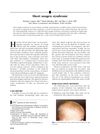 37 citations,
April 2010 in “FEBS Letters”
37 citations,
April 2010 in “FEBS Letters” The study concludes that the EDA2R gene is activated by p53 during chemotherapy but is not necessary for chemotherapy-induced hair loss.
 37 citations,
July 2005 in “Journal of The American Academy of Dermatology”
37 citations,
July 2005 in “Journal of The American Academy of Dermatology” Short anagen syndrome involves a hair growth phase lasting 1.5 years.
 36 citations,
January 2017 in “Journal of Obstetrics and Gynaecology Research”
36 citations,
January 2017 in “Journal of Obstetrics and Gynaecology Research” The review found no clear link between vitamin D receptor gene variations and polycystic ovary syndrome.
 36 citations,
October 2000 in “British Journal of Dermatology”
36 citations,
October 2000 in “British Journal of Dermatology” A different gene near the hairless gene on chromosome 8p21 causes a rare hair loss condition in a German family.
 36 citations,
November 1995 in “Clinical endocrinology”
36 citations,
November 1995 in “Clinical endocrinology” Low-dose flutamide helps reduce excessive hair growth and is even more effective with birth control, without bad effects on blood fats.
 35 citations,
November 2020 in “Dermatologic Therapy”
35 citations,
November 2020 in “Dermatologic Therapy” Severe COVID-19 may cause hair loss, and doctors recommend supplements and topical treatments to manage it.
 35 citations,
May 1986 in “Clinics in endocrinology and metabolism”
35 citations,
May 1986 in “Clinics in endocrinology and metabolism” The exact cause of increased 5α-reductase activity leading to hirsutism in women is still unknown.
 34 citations,
July 2014 in “Indian Dermatology Online Journal”
34 citations,
July 2014 in “Indian Dermatology Online Journal” Hair loss linked to metabolic issues and insulin resistance; early assessment may reduce future health risks.
 34 citations,
December 2012 in “Indian Journal of Dermatology, Venereology and Leprology”
34 citations,
December 2012 in “Indian Journal of Dermatology, Venereology and Leprology” Mesotherapy shows promise for cellulite and facial rejuvenation but has mixed results for body sculpting and hair loss, with more research needed for safety and effectiveness.
 33 citations,
September 2017 in “Molecules”
33 citations,
September 2017 in “Molecules” Red ginseng oil and its components help promote hair regrowth and could treat hair loss.









